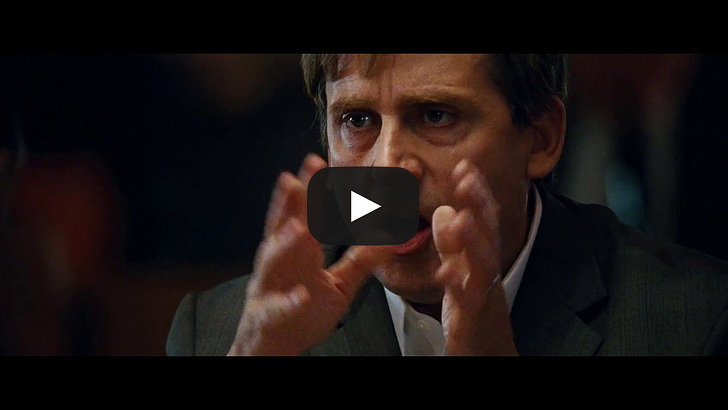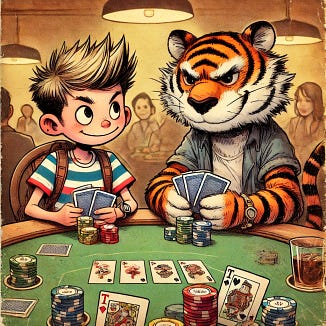You are a free subscriber to Me and the Money Printer. To upgrade to paid and receive the daily Capital Wave Report - which features our Red-Green market signals, subscribe here. Editor's Note: About to travel, so I’m writing stream of consciousness, trying to explain the financial wizardry that controls your life whether you know it or not... Dear Fellow Traveler, Yesterday, I promised to explain derivatives. When I went to Hopkins, my goal was to be able to explain to my mother what a derivative is in one sentence. On the front page of my thesis is this…
Warren Buffett said they were "financial weapons of mass destruction." However, the derivatives market now has a notional value of somewhere between $650 trillion and $1 quadrillion, depending on how you add it all up… That's QUADRILLION with a Q. That number represents the total face value of all contracts… the "notional" amount. The actual money at risk… the "gross market value… is much smaller, around $11 trillion to $15 trillion, depending on whom you ask. The "net" exposure after all the offsetting bets? That’s smaller too… But even the "smaller" number is still massive. It's still hidden. It's still unstable. It’s still looming… right in front of us… The entire global economy is worth roughly $100 trillion a year. (But there is $300 trillion in debt globally.) At the same time… we've created financial instruments with face values worth six to 10 times more than the actual value of all the assets on Earth. What could go wrong? BRRRRRRRRRRRRRRRRRRRRRRR. It’s Just Money, Right?So…. what the hell is a derivative? Here’s the answer that isn’t in a sentence… You and your buddy are watching the Super Bowl. You bet him $20 that the Chiefs will win. Congratulations. You just created a derivative. It's called a derivative because its value is "derived" from something else… In this case, the outcome of a football game. You don't own the Chiefs. You can't tackle Patrick Mahomes (seriously… you can’t… and you can’t land a 747 either during an emergency…) You have no control over the outcome. But you've got money riding on it anyway. Now let's make it weirder. Your other friend walks in and says, "I'll pay you $5 for the right to take over your bet if the Chiefs are winning at halftime." Now you've created a derivative OF a derivative. This is basically what Wall Street does all day, except instead of football games, they're betting on:
Isn’t finance great? From Your Bet to Global CatastropheHere's where derivatives get dangerous. The Super Bowl bet might just be $20 between friends. No big deal. But what if you could bet $20,000 using only $100 of your own money? What if you could make that same bet with 1,000 different people? What if you could then package all those bets together and sell them to someone else? What if that person could use those packaged bets as collateral to make even MORE bets? Welcome to the freaking derivatives market… This is where the bets have bets, and the bets on the bets have bets. The Greatest Trick Wall Street Ever PulledI won’t waste your time trying to explain the Commodity Futures Modernization Act of 2000 (CFMA). I’m using the wrong kind of scotch… and you’ll end up so confused as to why this law passed in the middle of the night (well, it was just about money) that you’ll lose faith in government… So, let’s discuss the outcome… Investment banks now tell you derivatives are about "risk management" and "price discovery." That’s what a decade of lobbying and public relations will do. (I used to write this crap for clients while in grad school… and I didn’t even realize what I was doing…) It was like saying casinos are about "probability education" and "social engagement." Sure, farmers use derivatives to lock in crop prices. Airlines hedge fuel costs. These are legitimate uses. But that's a small fraction of the market. The rest? Speculation until someone takes the time to explain to me otherwise... Wall Street, lobbyists, and the PR machine convinced everyone that you can reduce risk by creating more bets. Think about that for a second. They’re saying… Hey, worried about your investment? Why don't you make ANOTHER investment that pays off if your first investment fails? Or… Are you concerned about crashing your car in the future? Drive two cars at the same time, dummy… Now This Is FinanceWant to know how crazy this gets? By 2005-2006, Wall Street was running low on mortgages to package into CDOs (Collateralized Debt Obligations). So they created SYNTHETIC CDOs. These were derivatives that let you bet on the performance of CDOs via credit default swaps… essentially buying insurance on bonds you didn't even own. That’s what this scene is about in The Big Short. I believe this is one of the most important scenes in any movie… ever.  It's like gambling on someone else's house burning down. Another way… Imagine that the NFL season is ending soon and running out of football games to bet on… So you start betting on imaginary ones instead. When the housing market collapsed, these synthetic CDOs amplified the losses by 10 to 20 times. Watch the scene above again. A $100 million pile of bad mortgages could create $2 billion in losses. Finance is magic! The Volatility CasinoMy favorite insanity is the VIX… The "volatility index." This is a derivative that allows you to bet on the market's volatility. But wait, it gets better. You can buy derivatives ON the VIX. You can bet on bets about how volatile the bets will be. Then, some genius created the VVIX - the volatility of the volatility index. Stick with me (this scotch is working…) We now have derivatives that measure the volatility of market volatility. It's like betting on how much people will bet on betting. You think I’m done?Every bet needs someone on the other side. That’s the other part of all this… When you buy "insurance" on your bonds defaulting, someone else is selling that insurance. During the 2008 crisis, it became apparent that the company selling most of this insurance, AIG, didn't actually have the funds to pay out. They imploded… they got bailed out… you paid for it. Imagine crashing your car and finding out that the insurance company you’ve been paying for five years now doesn’t have any money. But not just any crash… One directly into you crash into a school bus. Full of orphans. On Christmas. The government had to give AIG $182 billion to pay off all these derivative bets. Thanks taxpayer… Isn’t finance wonderful? The Everything Bubble MachineToday's derivative market is big… way bigger than 2008. Because no one learns, and even if they’ve blown up twice, they will still tell us that the third time will be the charm (cough - it won’t.) We've got:
And how about…weather derivatives? Wanna bet on the temperature in Des Moines next Tuesday? Energy companies use these to hedge against mild winters. Hedge funds use them because... well, because they can bet on literally anything. Why not just create derivatives on how many times Elon tweets in a week? (Does that exist? Anyone want to start a company?) The Liquidity IllusionDerivatives create "fake liquidity." Everyone thinks they can sell their positions at any time. Everyone assumes their hedges will hold up. Everyone assumes there'll always be a buyer on the other side. Until there isn't. When everyone runs for the exit at once, you discover:
It's like everyone at the poker table suddenly realizing they're all playing with IOUs from each other. "But I don't trade derivatives," you say. That’s cute. Your pension fund does. Your insurance company does. Your bank does. That "stable value fund" in your 401k? Derivatives galore... That "risk-adjusted" portfolio your advisor built? Derivatives… Even your boring old S&P 500 index fund is affected by the massive derivatives market that trades based on it. You can't escape these… We've financialized everything. If it exists, someone has created a derivative of it. If it doesn't exist, someone has created a synthetic derivative based on it. Nobody knows where all these derivatives actually are. They're hidden in:
It's like termites in your house. You can't see them, but they're everywhere, eating away at the foundation. When the next crisis hits… and it will… we'll discover which banks, which funds, and which insurance companies were actually casinos in disguise. Even if only 1% of them blow up, that's still equivalent to nuking a major economy. But don't worry. The Fed will print more money. Congress will bail out more banks. And we'll all pretend to be shocked. "How could this happen AGAIN?" Because everyone was getting paid… Stay positive, Garrett Baldwin P.S. Next up… high-frequency trading… oh boy! About Me and the Money Printer Me and the Money Printer is a daily publication covering the financial markets through three critical equations. We track liquidity (money in the financial system), momentum (where money is moving in the system), and insider buying (where Smart Money at companies is moving their money). Combining these elements with a deep understanding of central banking and how the global system works has allowed us to navigate financial cycles and boost our probability of success as investors and traders. This insight is based on roughly 17 years of intensive academic work at four universities, extensive collaboration with market experts, and the joy of trial and error in research. You can take a free look at our worldview and thesis right here. Disclaimer Nothing in this email should be considered personalized financial advice. While we may answer your general customer questions, we are not licensed under securities laws to guide your investment situation. Do not consider any communication between you and Florida Republic employees as financial advice. The communication in this letter is for information and educational purposes unless otherwise strictly worded as a recommendation. Model portfolios are tracked to showcase a variety of academic, fundamental, and technical tools, and insight is provided to help readers gain knowledge and experience. Readers should not trade if they cannot handle a loss and should not trade more than they can afford to lose. There are large amounts of risk in the equity markets. Consider consulting with a professional before making decisions with your money. |
Subscribe to:
Post Comments (Atom)



0 Response to "What the Hell is That? Vol. 2..."
Post a Comment